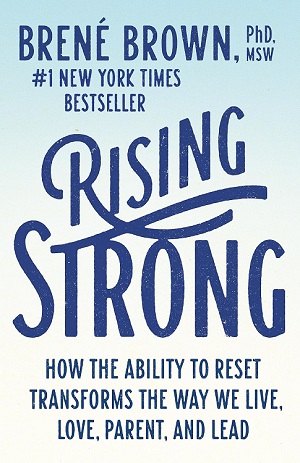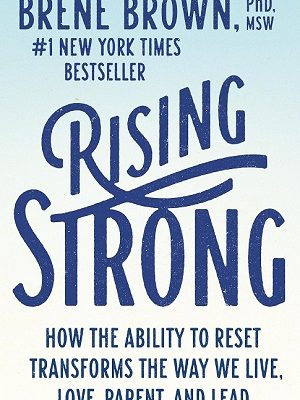Brené Brown’s Rising Strong is a profound exploration of how embracing vulnerability and the process of rising after a fall can transform the way we live, love, parent, and lead. Brown, a renowned researcher and storyteller, delves into the human experience of failure, disappointment, and heartache, offering actionable insights on how to recover and grow stronger from these inevitable experiences. Below, we’ll explore the key lessons from the book.

Read: Be Useful
1. The Physics of Vulnerability
1.1 The Importance of Vulnerability
- Concept: Brown argues that vulnerability is the birthplace of love, belonging, joy, courage, empathy, and creativity. To rise strong, we must first be willing to be vulnerable.
- Application: Embrace vulnerability in all areas of your life. Whether it’s in your relationships, work, or personal growth, allow yourself to be open and authentic, even when it feels uncomfortable.
- Example: Sharing your true feelings with a loved one, even at the risk of rejection, is an act of vulnerability that can lead to deeper connection and understanding.
1.2 The Fall: Acknowledging Our Struggles
- Concept: The “fall” represents the moments when we experience failure, disappointment, or heartache. Acknowledging the fall is the first step in the rising strong process.
- Application: Recognize and accept your struggles without judgment. Instead of suppressing or denying difficult emotions, face them head-on as part of your journey to growth.
- Example: After a setback at work, instead of ignoring your feelings, take time to acknowledge your disappointment and reflect on what you can learn from the experience.
Lesson: Vulnerability is not a weakness but a strength that allows us to experience deeper connections and personal growth. Acknowledging our falls is essential to rising strong.
2. The Reckoning – Embracing Our Emotions
2.1 Recognizing and Understanding Emotions
- Concept: The reckoning is about recognizing our emotions and understanding how they influence our thoughts and behaviors. This awareness is crucial for personal growth and resilience.
- Application: Practice mindfulness and emotional intelligence by tuning into your emotions as they arise. Understand the underlying causes of your feelings and how they impact your actions.
- Example: If you feel anger during a difficult conversation, instead of reacting impulsively, pause to explore what’s driving that anger. Are you feeling disrespected, unheard, or something else?
2.2 Storytelling: The Narratives We Create
- Concept: We often create stories in our minds to make sense of our emotions and experiences. These narratives can shape our reality, for better or worse.
- Application: Be aware of the stories you’re telling yourself. Are they based on facts or assumptions? Challenge these narratives by seeking the truth and avoiding the trap of negative self-talk.
- Example: If you’re feeling inadequate after a failure, examine the story you’re telling yourself. Is it true that you’re a failure, or is this a temporary setback that you can learn from?
Lesson: The reckoning involves recognizing and understanding our emotions, as well as the stories we create around them. By doing so, we can gain control over our responses and choose more empowering narratives.
3. The Rumble – Owning Our Stories
3.1 Getting Honest: Facing the Truth About Ourselves
- Concept: The rumble is where we face the truth about ourselves and our emotions. It’s a process of digging deep to uncover the root causes of our feelings and behaviors.
- Application: Engage in honest self-reflection. Be willing to confront uncomfortable truths about yourself and your actions. This honesty is essential for healing and growth.
- Example: If you realize that you’ve been avoiding conflict out of fear, confront that fear and explore where it comes from. This insight can help you address the underlying issue and improve your relationships.
3.2 Boundaries and Integrity
- Concept: Brown emphasizes the importance of setting boundaries and living with integrity. Owning our stories means aligning our actions with our values and principles.
- Application: Set clear boundaries in your personal and professional life. Ensure that your actions are consistent with your core values, even when it’s difficult.
- Example: If you value honesty but find yourself in a situation where you’re tempted to lie to avoid conflict, choose to be truthful. This alignment with your values will strengthen your integrity.
Lesson: The rumble is about getting honest with ourselves, setting boundaries, and living with integrity. By owning our stories, we can create positive change and build a life that reflects our true selves.
4. The Revolution – Writing a New Ending
4.1 Transforming Our Lives Through Resilience
- Concept: The revolution is the process of writing a new ending to our stories. It’s about transforming our lives by using what we’ve learned from the reckoning and rumbling.
- Application: Take what you’ve learned from your experiences and use it to make positive changes in your life. Embrace resilience and the power of choice to create a new, more fulfilling path.
- Example: After going through a difficult breakup, instead of closing yourself off from future relationships, use what you’ve learned to build healthier, more open connections in the future.
4.2 Choosing Courage Over Comfort
- Concept: Brown highlights the importance of choosing courage over comfort. The revolution requires us to step out of our comfort zones and take bold action toward our goals.
- Application: When faced with difficult decisions, prioritize courage over comfort. This means taking risks, embracing uncertainty, and being willing to make sacrifices for long-term growth.
- Example: If you’re unhappy in your job, choosing courage over comfort might mean leaving your secure position to pursue a career that aligns more closely with your passions and values.
4.3 Embracing Imperfection
- Concept: Rising strong is not about achieving perfection but about embracing our imperfections and learning from them. Brown encourages us to be kind to ourselves as we navigate this journey.
- Application: Let go of the need to be perfect and accept that mistakes and failures are part of the process. Practice self-compassion and allow yourself the grace to grow and evolve.
- Example: If you’ve made a mistake at work, instead of harshly criticizing yourself, recognize that everyone makes mistakes. Use it as a learning opportunity and move forward with greater wisdom.
Lesson: The revolution is about transforming our lives through resilience, choosing courage over comfort, and embracing imperfection. By writing a new ending to our stories, we can create a life that reflects our true potential.
Conclusion
Rising Strong by Brené Brown offers a powerful framework for navigating the challenges of life, love, parenting, and leadership. By embracing vulnerability, reckoning with our emotions, rumbling with the truth, and revolutionizing our stories, we can rise strong from our falls and create a more authentic and fulfilling life.
The lessons from this book emphasize the importance of resilience, courage, and self-compassion. By applying these principles, you can transform the way you approach challenges and setbacks, leading to personal growth and stronger, more meaningful connections with others (Amazon).



